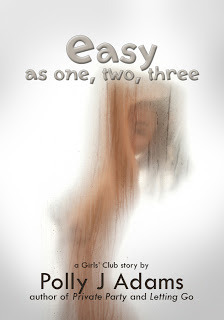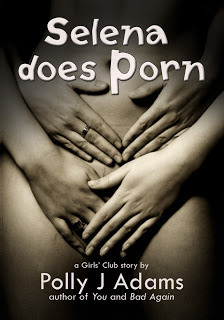Time for an adult content filter?
Is it odd for an erotica author to be arguing for an adult content filter at all outlets?
Perhaps.
 Filtered by Amazon: is the cover too explicit?It'd be nice to think we could just leave people to find what they want and avoid stuff that might offend them, but it doesn't always work like that.
Filtered by Amazon: is the cover too explicit?It'd be nice to think we could just leave people to find what they want and avoid stuff that might offend them, but it doesn't always work like that.
Our children search Amazon, for example. And they might find an apparently innocent title like Easy as One, Two, Three and click the link, unaware that the resulting page will the a description of a title full of masturbation, girl-on-girl sex in the gym shower and ending in a threesome between the protagonist and two men she met at the aforementioned gym.
So yes, I'd like to think that there are ways of preventing this from happening.
This year we've seen exactly that starting to emerge, but it's been done in such a clumsy, reactionary manner that no-one benefits.
First we had PayPal. Their terms and conditions state that no-one should use their services to receive payment for pretty much anything they don't approve of. So sites that sell adult material couldn't use PayPal. Fair enough. But then they decided that this extended to sites like Smashwords for payments to authors - they might not be publicly taking payment for erotica via PayPal, but if they paid authors who included erotica in their output then PayPal no longer approved. This was a marked shift in the landscape and both a serious problem for companies like Smashwords, and for the authors and publishers they worked with - Smashwords is the main route into distribution through Barnes and Noble, Apple, Sony and others for many of us.
While Smashwords fought this shift, and eventually won, others used it as an excuse to 'clean up' their act, either removing erotica altogether or sidelining it so that it was, effectively, hidden away from their customers.
Currently, we're seeing a slew of emails from Apple informing publishers that titles have been removed from the iTunes bookstore on the grounds of 'objectionable content'. Meanwhile, over at Amazon, an 'adult' filter has been applied by stealth. Suddenly titles are being marked as 'adult'; this isn't visible on Amazon's pages, unless you look at the source-code, but it means that books marked up in this way will be hidden from some searches. Bizarrely, many clearly adult books, get marked as 'not adult' - there's clearly a distinction being made between smutty and, you know, really smutty.
So what kind of things are the distributors objecting to?
As far as content goes, they seem to be targetting barely legal and what's become known as pseudo-incest. Under the distributors' terms and conditions, erotica about under-age sex or incest is clearly prohibited. To cater for audiences who are attracted to the borderlines of the taboo, the genres of barely legal (not underage, but pushing the limit - often babysitter stories and similar), and pseudo-incest (Daddy stories where the daddy in question is a step-father and the kids grown-up, and similar) have emerged, to huge commercial success.
It's risky stuff, and we could argue about the rights and wrongs of this kind of material, but that's another blog post entirely. The underlying point is clear though: these stories are neither illegal (or about illegal activities) nor breaking most distributors' terms and conditions.
 Filtered by Amazon: is the cover too explicit?And to me, if such stories are are not illegal, or breaking commercial agreements, then any behind-the-scenes attempts to make it difficult to find them are, to say the least, scary. One day, someone at one company decides barely legal and PI should be obstructed or removed altogether; the next, someone at another distributor doesn't want gay erotica, or BDSM, or adultery, or any number of categories on a long, long list.
Filtered by Amazon: is the cover too explicit?And to me, if such stories are are not illegal, or breaking commercial agreements, then any behind-the-scenes attempts to make it difficult to find them are, to say the least, scary. One day, someone at one company decides barely legal and PI should be obstructed or removed altogether; the next, someone at another distributor doesn't want gay erotica, or BDSM, or adultery, or any number of categories on a long, long list.
It's a slippery slope, and one that exposes all kinds of topics to censorship by a powerful, unelected few.
Another thing they're objecting to is some covers. I've had at least two books filtered by Amazon. There's no PI or barely legal there - the books are explicit, but no more so than most erotica at Amazon. The filter, in these cases, is down to the covers: a bit too much flesh in one case, two many hands on the body in the other (is that a sexual act, or merely four hands covering the rude bits?).
These two books have suffered as a result. They're harder to find and their sales have fallen.
So why am I arguing for a filter?
I don't have a problem with filters in principle. In fact I'm all for it. I want my books to be found by adult smut readers, not kids - whether they're searching for rude stuff deliberately or finding it through some more innocent search.
But applying filters on the quiet, in an arbitrary way that seems to depend on which poorly-paid bottom of the food-chain worker happens to be looking and applying their own interpretation of Head Office guidelines... that sucks big time.
It doesn't work for anyone when filters are applied in this way. It makes publishing and writing in this field a lottery. On the forums we're all trying to second-guess what it is, exactly, that gets a book filtered and what doesn't. We know from experience that explicit covers sell books, and that pushing at taboos finds audiences, but now it's a constant dance of trying to guess where those limits currently fall and trying to get as close to them as possible. Titles published a month ago without problem, may fall foul of changed guidelines if we so much as change a comma in the book's description today, because that might trigger a check under the new regime.
Whatever the hell that may currently be.
So if the filters don't work for us on the publishing side, do they actually work for anyone?
No, they don't.
They don't work for the distributors, for a start, which should worry them. Authors who have been earning significant money are suddenly finding their income bottlenecked by the filtering and blocks. If big-earning writers are losing out in this way, the distributors are doing so too.
And what about the poor readers?
Sex sells. People want to read about it. They like dirty stories. E-publishing has - and should still - make it easy for people to get their hots from a good story.
But these filters are invisible to most readers. As writers and publishers we spot what's going on, but most readers aren't even aware that it's happening. They're used to going to Amazon or iTunes, searching for 'blowjobs', 'gangbangs' or whatever, and finding a slew of books that will get them off. How many readers understand that searching for smut from Amazon's home page now returns different results to when you do so within the Kindle store? (And why would Amazon think that applying a filter for general searches but not within the Kindle store would actually be effective in any way? But that's one of the ways their new adult filter works.)
Filtering is good. Or it should be. A standard, sensible mechanism that is applied consistently, so that it effectively filters those who shouldn't be looking (or, at least, finding!) but allows everyone else to find what they want... Wouldn't that be good? Of course it wouldn't be perfect (kids are great at finding ways around adult controls), but it has to be better than the ever-shifting lottery we have now (where kids don't have to even bother getting round the controls, they just get the same fucked-up results as the rest of us).
I want my readers and potential readers to find my books as easily as possible; I don't want kids (or, for that matter, reactionary prudes) to stumble across my work. I don't want arbitrary, unclear policies to be applied behind the scenes, following rules we don't understand, and applied inconsistently by people who really don't have a fucking clue.
Is that too much to ask?

Perhaps.
 Filtered by Amazon: is the cover too explicit?It'd be nice to think we could just leave people to find what they want and avoid stuff that might offend them, but it doesn't always work like that.
Filtered by Amazon: is the cover too explicit?It'd be nice to think we could just leave people to find what they want and avoid stuff that might offend them, but it doesn't always work like that.Our children search Amazon, for example. And they might find an apparently innocent title like Easy as One, Two, Three and click the link, unaware that the resulting page will the a description of a title full of masturbation, girl-on-girl sex in the gym shower and ending in a threesome between the protagonist and two men she met at the aforementioned gym.
So yes, I'd like to think that there are ways of preventing this from happening.
This year we've seen exactly that starting to emerge, but it's been done in such a clumsy, reactionary manner that no-one benefits.
First we had PayPal. Their terms and conditions state that no-one should use their services to receive payment for pretty much anything they don't approve of. So sites that sell adult material couldn't use PayPal. Fair enough. But then they decided that this extended to sites like Smashwords for payments to authors - they might not be publicly taking payment for erotica via PayPal, but if they paid authors who included erotica in their output then PayPal no longer approved. This was a marked shift in the landscape and both a serious problem for companies like Smashwords, and for the authors and publishers they worked with - Smashwords is the main route into distribution through Barnes and Noble, Apple, Sony and others for many of us.
While Smashwords fought this shift, and eventually won, others used it as an excuse to 'clean up' their act, either removing erotica altogether or sidelining it so that it was, effectively, hidden away from their customers.
Currently, we're seeing a slew of emails from Apple informing publishers that titles have been removed from the iTunes bookstore on the grounds of 'objectionable content'. Meanwhile, over at Amazon, an 'adult' filter has been applied by stealth. Suddenly titles are being marked as 'adult'; this isn't visible on Amazon's pages, unless you look at the source-code, but it means that books marked up in this way will be hidden from some searches. Bizarrely, many clearly adult books, get marked as 'not adult' - there's clearly a distinction being made between smutty and, you know, really smutty.
So what kind of things are the distributors objecting to?
As far as content goes, they seem to be targetting barely legal and what's become known as pseudo-incest. Under the distributors' terms and conditions, erotica about under-age sex or incest is clearly prohibited. To cater for audiences who are attracted to the borderlines of the taboo, the genres of barely legal (not underage, but pushing the limit - often babysitter stories and similar), and pseudo-incest (Daddy stories where the daddy in question is a step-father and the kids grown-up, and similar) have emerged, to huge commercial success.
It's risky stuff, and we could argue about the rights and wrongs of this kind of material, but that's another blog post entirely. The underlying point is clear though: these stories are neither illegal (or about illegal activities) nor breaking most distributors' terms and conditions.
 Filtered by Amazon: is the cover too explicit?And to me, if such stories are are not illegal, or breaking commercial agreements, then any behind-the-scenes attempts to make it difficult to find them are, to say the least, scary. One day, someone at one company decides barely legal and PI should be obstructed or removed altogether; the next, someone at another distributor doesn't want gay erotica, or BDSM, or adultery, or any number of categories on a long, long list.
Filtered by Amazon: is the cover too explicit?And to me, if such stories are are not illegal, or breaking commercial agreements, then any behind-the-scenes attempts to make it difficult to find them are, to say the least, scary. One day, someone at one company decides barely legal and PI should be obstructed or removed altogether; the next, someone at another distributor doesn't want gay erotica, or BDSM, or adultery, or any number of categories on a long, long list. It's a slippery slope, and one that exposes all kinds of topics to censorship by a powerful, unelected few.
Another thing they're objecting to is some covers. I've had at least two books filtered by Amazon. There's no PI or barely legal there - the books are explicit, but no more so than most erotica at Amazon. The filter, in these cases, is down to the covers: a bit too much flesh in one case, two many hands on the body in the other (is that a sexual act, or merely four hands covering the rude bits?).
These two books have suffered as a result. They're harder to find and their sales have fallen.
So why am I arguing for a filter?
I don't have a problem with filters in principle. In fact I'm all for it. I want my books to be found by adult smut readers, not kids - whether they're searching for rude stuff deliberately or finding it through some more innocent search.
But applying filters on the quiet, in an arbitrary way that seems to depend on which poorly-paid bottom of the food-chain worker happens to be looking and applying their own interpretation of Head Office guidelines... that sucks big time.
It doesn't work for anyone when filters are applied in this way. It makes publishing and writing in this field a lottery. On the forums we're all trying to second-guess what it is, exactly, that gets a book filtered and what doesn't. We know from experience that explicit covers sell books, and that pushing at taboos finds audiences, but now it's a constant dance of trying to guess where those limits currently fall and trying to get as close to them as possible. Titles published a month ago without problem, may fall foul of changed guidelines if we so much as change a comma in the book's description today, because that might trigger a check under the new regime.
Whatever the hell that may currently be.
So if the filters don't work for us on the publishing side, do they actually work for anyone?
No, they don't.
They don't work for the distributors, for a start, which should worry them. Authors who have been earning significant money are suddenly finding their income bottlenecked by the filtering and blocks. If big-earning writers are losing out in this way, the distributors are doing so too.
And what about the poor readers?
Sex sells. People want to read about it. They like dirty stories. E-publishing has - and should still - make it easy for people to get their hots from a good story.
But these filters are invisible to most readers. As writers and publishers we spot what's going on, but most readers aren't even aware that it's happening. They're used to going to Amazon or iTunes, searching for 'blowjobs', 'gangbangs' or whatever, and finding a slew of books that will get them off. How many readers understand that searching for smut from Amazon's home page now returns different results to when you do so within the Kindle store? (And why would Amazon think that applying a filter for general searches but not within the Kindle store would actually be effective in any way? But that's one of the ways their new adult filter works.)
Filtering is good. Or it should be. A standard, sensible mechanism that is applied consistently, so that it effectively filters those who shouldn't be looking (or, at least, finding!) but allows everyone else to find what they want... Wouldn't that be good? Of course it wouldn't be perfect (kids are great at finding ways around adult controls), but it has to be better than the ever-shifting lottery we have now (where kids don't have to even bother getting round the controls, they just get the same fucked-up results as the rest of us).
I want my readers and potential readers to find my books as easily as possible; I don't want kids (or, for that matter, reactionary prudes) to stumble across my work. I don't want arbitrary, unclear policies to be applied behind the scenes, following rules we don't understand, and applied inconsistently by people who really don't have a fucking clue.
Is that too much to ask?
Published on May 04, 2012 14:05
No comments have been added yet.



